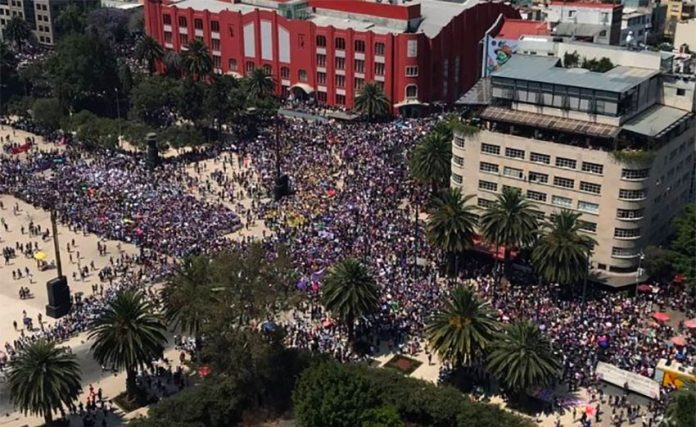An estimated 80,000 women flooded the streets of central Mexico City on Sunday to denounce gender-based violence in Mexico’s biggest ever International Women’s Day march.
Women and girls of all ages, many dressed in purple – the color of the feminist movement – and wearing green kerchiefs in support of abortion rights, marched from the Monument to the Revolution just outside the historic center of Mexico City to the zócalo, the capital’s central square bordered by the National Palace and the Metropolitan Cathedral.
Made up of at least 70 different feminist and women’s rights groups as well as large numbers of women who marched of their own accord, the protesters clamored for justice, equality and most loudly for an end to the gender-based violence in Mexico, where an average of 10 women are murdered every day.
While the vast majority of participants marched peacefully to the zócalo, a small number of protesters smashed the windows of businesses and other buildings along the route and graffitied anti-government and anti-violence messages such as “kill your rapist,” “misogynistic Mexico,” “the president doesn’t care about us” and “ni una más” (not one more femicide victim) on their facades.
Among the businesses that sustained extensive damage and defacement were a Starbucks cafe and KFC restaurant on Juárez Avenue.
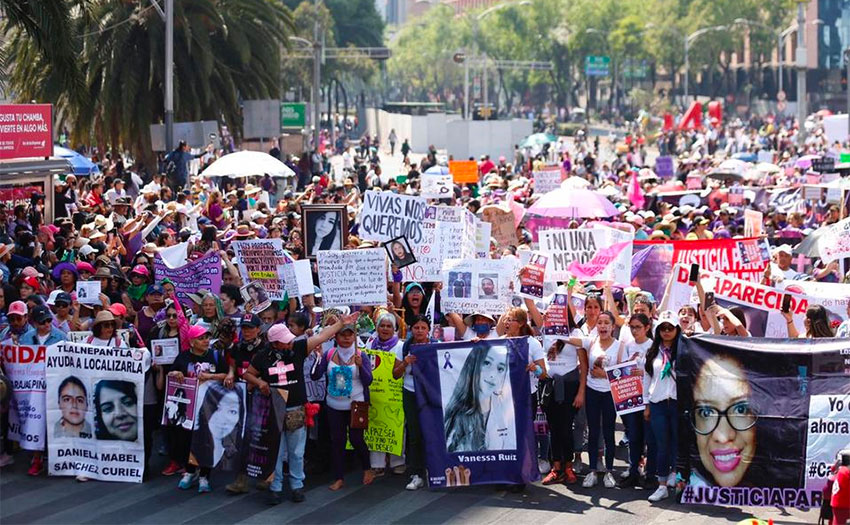
Mexico City authorities covered or cordoned off many monuments prior to Sunday afternoon’s march but were nevertheless unable to prevent the vandalization of some, such as the Monument to the Revolution and the bright yellow horse’s head sculpture next to the Torre del Caballito skyscraper.
A statue of independence hero Francisco Madero in the Alameda Central park was spray-painted and attacked with hammers by a group of hooded women.
Another group of women clashed with men outside the Metropolitan Cathedral who were protesting abortion and made Nazi salutes toward the demonstration. The Mexico City government said that six people who attacked the protesters outside the church were taken into custody.
A large police contingent, including almost 3,000 female riot police, watched over the march but in most cases did not intervene to stop acts of vandalism.
As anti-violence activists addressed the protesters in a jam-packed zócalo, a series of loud explosions was heard as Molotov cocktails were thrown at the wooden door of the National Palace.
March organizers accused men who had infiltrated the march of hurling the explosives, although video footage shows a woman launching one Molotov cocktail. A female photographer for the newspaper El Universal was hospitalized after her legs caught fire and she sustained first and second-degree burns.
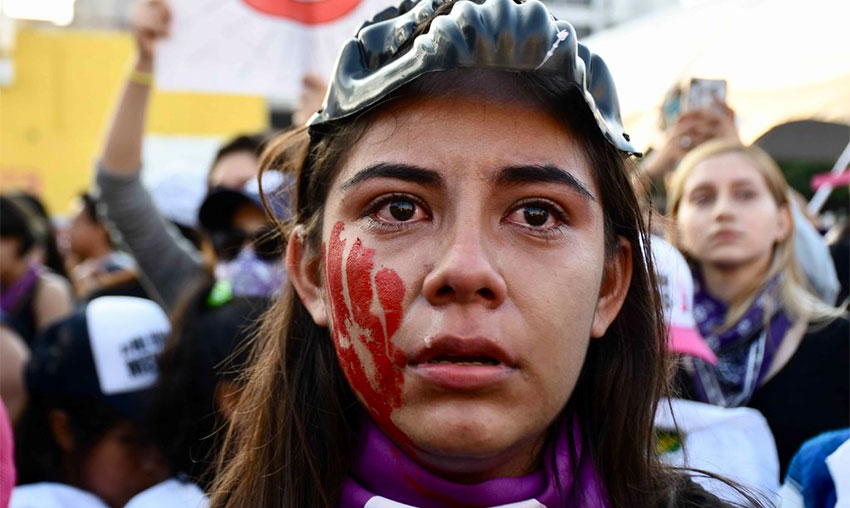
A total of 13 people, including four policewomen, were hospitalized for injuries or burns but none was in grave condition, the Mexico City government said in a statement. Another 52 people were injured but didn’t require hospital treatment.
Sunday’s march came just weeks after the femicides of a 25-year-old woman and a 7-year-old girl in Mexico City shocked the nation, triggered protests and gave added impetus to the feminist movement and the demand for the government to respond in a meaningful way to the scourge of violence against women.
“We are in the zócalo with organized fury,” said one anti-violence activist and march organizer speaking at Sunday afternoon’s rally.
“More than a year after the arrival of the new government, our demands remain unanswered. We don’t accept [President] López Obrador playing down our demands,” she added.
“We tell the president that the victims have a name, the victims have families,” said another activist from the stage set up in the central square.
María de la Luz Estrada, president of the National Citizens’ Observatory on Femicide, told BBC News that there have been 8,000 murders of women in the last two years, adding that around half of those showed the traits of gender-based violence against women. Femicides – murders of women and girls on account of their gender – have increased 137% over the past five years.
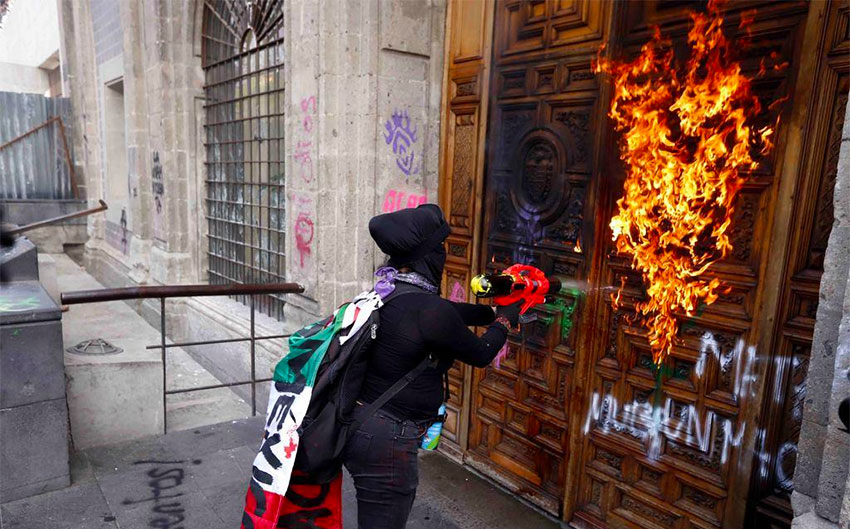
López Obrador, who has vowed to “transform” Mexico, recently came under fire for his response to the violence crisis, with many women labeling him tone-deaf, out of touch, insensitive and no different from his predecessors.
After the National Palace was defaced during a protest in February, he said: “I ask all the feminists, with due respect, don’t paint on our doors and our walls, we are working to stop femicides.”
After the murder of 7-year-old girl Fátima, the president blamed the “neoliberal” policies of past governments for the high levels of gender-based violence.
“The extent of social breakdown produced by neoliberal policy cannot be measured; there is a profound crisis in loss of values. … We’re working so that there are no femicides. We’re not pretending,” López Obrador said.
De la Luz Estrada told BBC that the president’s response to the recent femicides, and the protests they triggered, missed the point entirely.
“Mexico’s young women are saying ‘I don’t want to be afraid’ and ‘I want to be able to walk home freely.’ They are demanding that the new government fulfill its promise to act differently because they said they wouldn’t turn away like previous administrations,” she said.
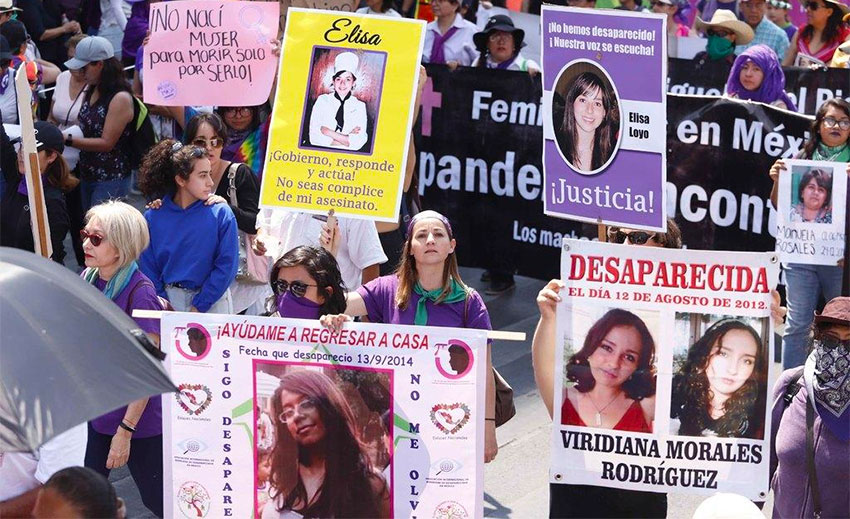
The anger of women goes beyond the recent murders of 25-year-old Ingrid Escamilla, whose body was mutilated by her domestic partner, and Fátima, de la Estrada said, explaining that it is fueled by decades of indifference toward gender-based violence and rampant impunity for those who perpetrate it.
“We have taken to the streets in the past. We have denounced the violence and have never been listened to,” she said, adding that the younger generation of women has had enough.
“They’re saying: ‘if we break things up, now they’re going to listen to us.’ If women keep being harmed and the authorities won’t act, then we’ll just have to protect ourselves,” de la Estrada said.
Marches to mark International Women’s Day were also held in many other parts of Mexico on Sunday including Guadalajara, the country’s second-biggest city, where the water in a public fountain was dyed red to symbolize the spilled blood of murdered women.
The demonstrations preceded Monday’s national women’s strike for which millions of girls and women were expected to skip school, university and work to send a clear message of condemnation of gender-based violence.
Source: El Universal (sp), BBC News (en)
